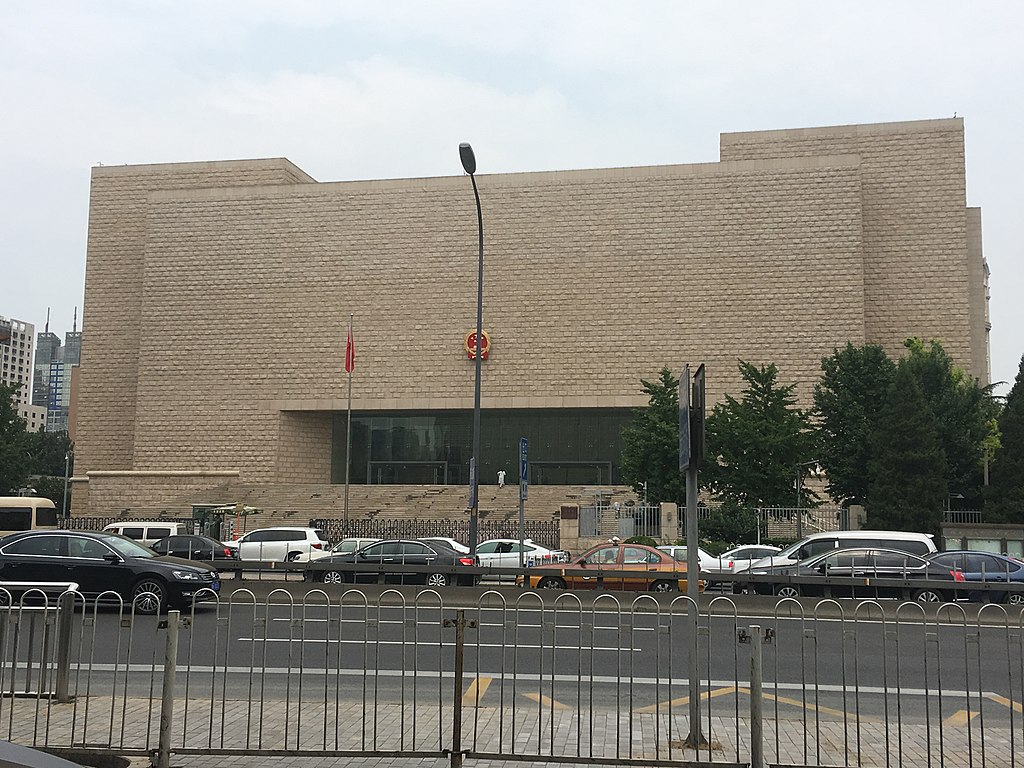No Exit: China’s Growing Use of Exit Bans Violates International Law
In November last year, the New York Times broke the sad story of Victor and Cynthia Liu, American citizens who entered China in June 2018, and have since been barred from leaving the country.

In November last year, the New York Times broke the sad story of Victor and Cynthia Liu, American citizens who entered China in June 2018, and have since been barred from leaving the country. Although they have not been detained, they are being blocked from leaving China under a so-called “exit ban,” a tool increasingly used by Chinese authorities to increase leverage over individuals accused of wrongdoing, or who merely have found themselves on the wrong side of a business dispute.
Their case is part of an emerging—and quite troubling—pattern of official Chinese efforts to use foreign nationals as bargaining chips in disputes with other parties, including private individuals, overseas companies, or even other countries.
The Lius’ case received a splash of attention when it first broke—it was, after all, the first detailed accounting of China’s use of exit bans against American citizens. Since then, their plight has vanished from the headlines. And yet, the case is very much worthy of note: First and foremost, the Chinese government is blocking two innocent American citizens from returning to their home country, in violation of international law. At the same time, the treatment of Victor and Cynthia Liu is part of a larger pattern of Beijing’s growing disregard for the rights of foreign nationals present in China, when those rights come into conflict with the Communist Party’s own political priorities.
Victor and Cynthia had traveled to China last summer with their mother, Sandra Han, in order to visit their ailing grandfather. They soon found themselves enmeshed in one of China’s biggest corruption cases, effectively held hostage by Chinese authorities seeking to flush out their father, Liu Changming.
Ms. Han, a naturalized American citizen herself, was detained soon after arriving in China. According to the Times, she is being held in a secret detention site, known in China as a “black jail.” It is not known whether she has been given access to an attorney, or whether other key due process rights are being accorded to her. She has, however, been allowed to visit with U.S. consular officials, as is required under international law.
Liu Changming, a former Bank of Communications official, was allegedly a key player in a $1.4 billion fraud scheme. Liu, apparently aware that the authorities were closing in, fled China in 2007. By that time, he had already moved his family and significant assets overseas. Liu has been estranged from his family for several years, and his current whereabouts are unknown.
Victor Liu, 19, is a sophomore at Georgetown University. (The author, who teaches at Georgetown Law, has not had any contact with Liu, and has not been involved in the university’s extensive efforts to bring Liu back to campus.) His sister Cynthia, 27, was about to start a new job at McKinsey & Company in New York. Both have seen their lives completely interrupted, and have been left utterly in the dark as to when and how they might be allowed to return to the United States.
China’s growing use of exit bans raises key questions about the country’s commitment to the rule of law and to its obligations under international law. The domestic legal framework governing exit bans is unclear, and many individuals who have been subjected to them have complained about their opacity and unfairness. “There is no transparency about this procedure,” Chinese rights lawyer Si Weijiang said recently in a media interview; “[i]t is very easy to put a person on this list. You don’t get any judicial remedy.”
The Chinese government regularly applies exit bans against its own citizens, often forbidding activists and liberal intellectuals from leaving the country to attend key international meetings. In November last year, for example, the prominent economist Sheng Hong was blocked from attending a conference at Harvard University marking the 40th anniversary of Reform and Opening in China. Sheng was told by authorities that allowing him to travel to Cambridge for the conference might “endanger national security.”
Victor and Cynthia Liu’s case is part of a growing trend: As many as two dozen U.S. citizens were prevented from leaving China over the past two years. In some cases, Chinese authorities used U.S. citizens as leverage to compel family members abroad to return to China. Chinese authorities have also placed exit bans on foreign nationals involved in business disputes with Chinese companies. The U.S government has taken notice: The State Department issued a warning in January 2018 to U.S. citizens traveling to China about the risks posed by exit bans.
Depending on how they are applied, exit bans can also violate an individual’s right to leave under international law. Article 13.2 of the Universal Declaration of Human Rights (UDHR) states that “(e)veryone has the right to leave any country, including his own, and to return to his country.” This language is mirrored in Article 12.2 of the International Covenant on Civil and Political Rights (ICCPR), which China has signed but not yet ratified. Article 12.3 of the ICCPR makes clear that the right to leave can only be subject to restrictions if those limitations are “provided by law, are necessary to protect national security, public order… or the rights and freedoms of others.”
China is, of course, bound by the UDHR, which is generally considered to be customary international law. At the same time, as a signatory to the ICCPR, China has an obligation not to take any action that undermines the object and purpose of the Covenant prior to state ratification.
In terms of their core rights, then, Victor and Cynthia Liu have both the ICCPR and the UDHR on their side. And yet, if a state can make use of exit bans in order to preserve public order, then couldn’t the ban against Victor and Cynthia Liu be justified on the basis of the ongoing criminal investigation against their father? States regularly confiscate the passports of individuals accused of committing a crime, for example. Couldn’t such a practice be extended to family members of the accused as well?
Not if, as in this case, the individuals involved have no material connection to the alleged crime itself. Both Victor and Cynthia Liu were young children when Liu Changming was working in China’s banking sector, and have made clear that they have no knowledge of their father’s activities or current whereabouts. Though Chinese authorities have at times intimated that Victor and Cynthia are themselves under investigation, they have yet to produce any credible evidence against them, more than seven months after they entered China.
In its General Comment on Article 12, the U.N. Human Rights Committee states that any restrictions on an individual’s Article 12 rights must be both necessary and proportional to achieve the state’s goals, and also that such restrictions must be based on “clear legal grounds.” Taking their cue from the Human Rights Committee, the international bodies and regional tribunals that have expounded on the right to leave have tended to define permissible restrictions on the right very narrowly. In cases involving criminal investigations, international and regional bodies have tended to focus on restrictions that could be placed on individuals themselves accused of a crime. This author was unable to identify any case in which an indefinite travel ban placed on an accused’s family members was upheld by any international body or tribunal. Given this context, it is unlikely that the severe restrictions on Victor and Cynthia Liu’s Article 12 rights would be deemed either necessary or proportional under international law.
Foreign governments, particularly the United States, should take note: More and more often, Beijing has proved willing to use foreign nationals as bargaining chips, or to otherwise disregard the rights of foreign nationals when politically expedient. In December, Canadian nationals Michael Kovrig and Michael Spavor were detained by Chinese authorities. They have yet to be formally charged with any crime. Their detentions almost certainly were directly linked to a Canadian court’s decision to detain Huawei executive Meng Wanzhou in response to a U.S. extradition request. In other cases, mostly involving naturalized foreign citizens of Chinese descent detained in China, Chinese officials have refused to allow for consular notification and visitation, as required under international law.
As this piece was going to press, China dramatically escalated its use of foreign nationals as political pawns. On January 14, a court in Dalian, China, sentenced Canadian national Robert Schellenberg to death for drug smuggling. As Don Clarke has written elsewhere on Lawfare, the handling of Schellenberg’s case was dramatically accelerated after Meng Wanzhou’s detention in Vancouver, suggesting that the two cases are linked: Beijing may be seeking to use the prospect of Schellenberg’s execution to increase the pressure on Ottawa to free Meng.
To its credit, the Trump administration has repeatedly raised the Lius’ case with senior Chinese officials. It should continue to urge Beijing at every possible opportunity to allow Victor and Cynthia Liu to return home. Absent sustained efforts by the U.S., the Lius could be stuck in China indefinitely.
At the same time, the United States, Canada, and other countries need to come up with a longer-term strategy to deal with China’s increasing disregard for the rights of foreign nationals in China. Such a strategy might include coordinated efforts by like-minded governments to press Beijing on individual cases; increased use of relevant U.N. mechanisms to push China to honor its obligations under international law; and more outreach to universities and companies that are active in China, to encourage them to be ready to handle such cases involving their own students or employees, if and when they arise.
If I were advising Beijing on the Liu case, I would suggest to the Party leadership that the harm that they are doing to China’s reputation is not worth any additional leverage that they may be gaining over Liu Changming. No doubt, few Americans will harbor much sympathy for Liu Changming himself: If the Chinese government has sufficient evidence to prove the serious allegations against him, he should indeed face a fair trial back home. And if he is convicted, he should go to jail. For her part, Sandra Han should be allowed to visit with a lawyer, and should not be held in indefinite, incommunicado detention.
At the same time, few Americans will look favorably on the Party’s decision to hold Victor and Cynthia hostage over their father’s alleged transgressions. Whatever happens with Liu Changming’s case, Beijing has given itself a black eye in the court of public opinion here in the United States, and no doubt in several other countries as well. At a time when Washington is debating its long-term strategy on China, Beijing can ill afford to alienate potential allies, or to hand additional ammunition to its harshest critics in Washington. There is only one way to undo the damage: The Party should declare that it has concluded its investigation of Victor and Cynthia Liu, and has determined that they are not connected to their father’s case in any way. It should then allow them to leave China immediately, and resume their interrupted lives in the United States.





